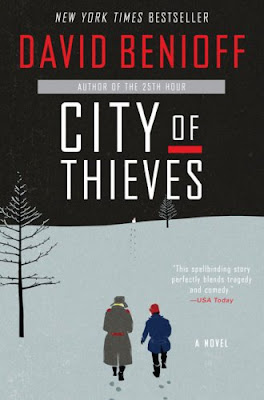By Jamie Ford
Read in your best Estelle Getty:
Picture it. Seattle, 1942. Like most North American cities of the time, whites, blacks, Chinese and Japanese live in separate neighborhoods, their children attend different schools and prejudice is worn proudly on one's sleeve. Henry Lee’s father is a Chinese Nationalist with a deep rooted hatred for the Japanese, who are waging war in his former homeland. In Seattle, he sends 12 year-old Henry to an all-white school with an “I am Chinese” button pinned to his shirt. Naturally, he is the target of bullies who don't see the difference between Japanese and Chinese. His only deliverance is Keiko, a Japanese girl with whom he develops a lifelong bond. Although circumstances keep them apart, Henry never forgets her.
Picture it. Seattle, 1986. An older Henry, recently widowed reflects on the war years and his time with Keiko before and after her family's interment. The coincidental discovery of items left behind by Japanese-Americans in the basement of a downtown hotel inspires Henry to reveal the story of Keiko to his own son in an effort to repair their own fraying bond.
/Estelle Getty
Jamie Ford's debut novel is a strong declaration of purpose from a promising writer. Although not without fault, Hotel on the Corner of Bitter and Sweet deserves some applause its characterization of an era that doesn't get the attention it deserves from the literary community (The Japanese Internment) and deserves a certain measure of comparison to Julian Barnes's Booker Prize winning novel A Sense of an Ending in that both novels bookend of the protagonist's life via a story that begins in childhood and ends in old age (while, it would seem, stagnating during the middle part of life). In fact, Hotel on the Corner of Bitter and Sweet reveals virtually nothing of Henry's forty year marriage to his wife, a two-dimensional character rendered with so little characterization that the reader is left confused as to whether Henry really ever had feelings for his wife at all.
But that's okay because that is the sort of characterization that gets to the heart of the Chinese sense of familial duty and the complexity of the relationship between Chinese father and Chinese son. Ancestral obligations are often stronger than any personal bond one might make outside the family and Hotel at the Corner of Bitter and Sweet, in that respect is an interesting examination of Chinese experience in America and the cultural shackles that stretch across the Pacific. Henry's father, though fiercely proud that he is able to live and educate his son in America, never once identifies himself or any member of his family as American. The button he forces his son to wear to school, ostensibly to keep him from being identified as a Japanese, speaks volumes about Henry's fathers ancestral and familial morality. It is equally important that Henry be identified as Not Japanese as it is for him to be identified as Not American, a point that causes more than a little friction between father and son.
Which brings us seamlessly to the subject of prejudice in this novel. Hotel on the Corner of Bitter and Sweet is, at its core, an interesting examination of the ingrained prejudice both within American society toward visible minorities (especially toward Japanese Americans) and the prejudices that were imported along with ethnic populations from abroad onto American soil. The racial tension not only between White Americans and Japanese Americans (which, retroactively speaking, makes a degree of sense) but also the tension between White Americans and Non-Japanese Asians (i.e. Chinese, Korean, Vietnamese) and the tension between the Chinese and Japanese populations speaks volumes about the very real anxiety of the time and how very close it all came to boiling over on the home front. Though the inclusion of Sheldon, the black jazz musician did seem a tad contrived (one too many ethnicities in the literary melting pot spoils the broth, apparently).
But not everything works in this novel. The tone is, at times, overly sentimental.
"I was so worried about my family. Worried about everything. I was confused. I didn't know what I wanted. I didn't know what good-bye really was."Emo during World War II? Apparently, yes. A good lesson: Let the reader feel rather than force the feeling.
As well, the prose is often repetitive. If an author employs a flashback it seems rather unnecessary to include the actual account of flashback to another character in the present, but that is precisely what Ford does at several points in this novel, giving Hotel on the Corner of Bitter and Sweet an unpolished feel. Also, Henry speaks in an unnatural, stilted manner that makes you wonder whether he was ever actually 12 years old.
But don't let saccharine sentimentality and wooden dialogue stand in the way of a decent debut. Jamie Ford's got a lot of promise as an author and overall, Hotel on the Corner of Bitter and Sweet is as good as any debut novel you're going to read this year or next. I mean, if you can't forgive an author a few transgressions for the sake of a good story and an interesting backdrop well, who are you anyway?









